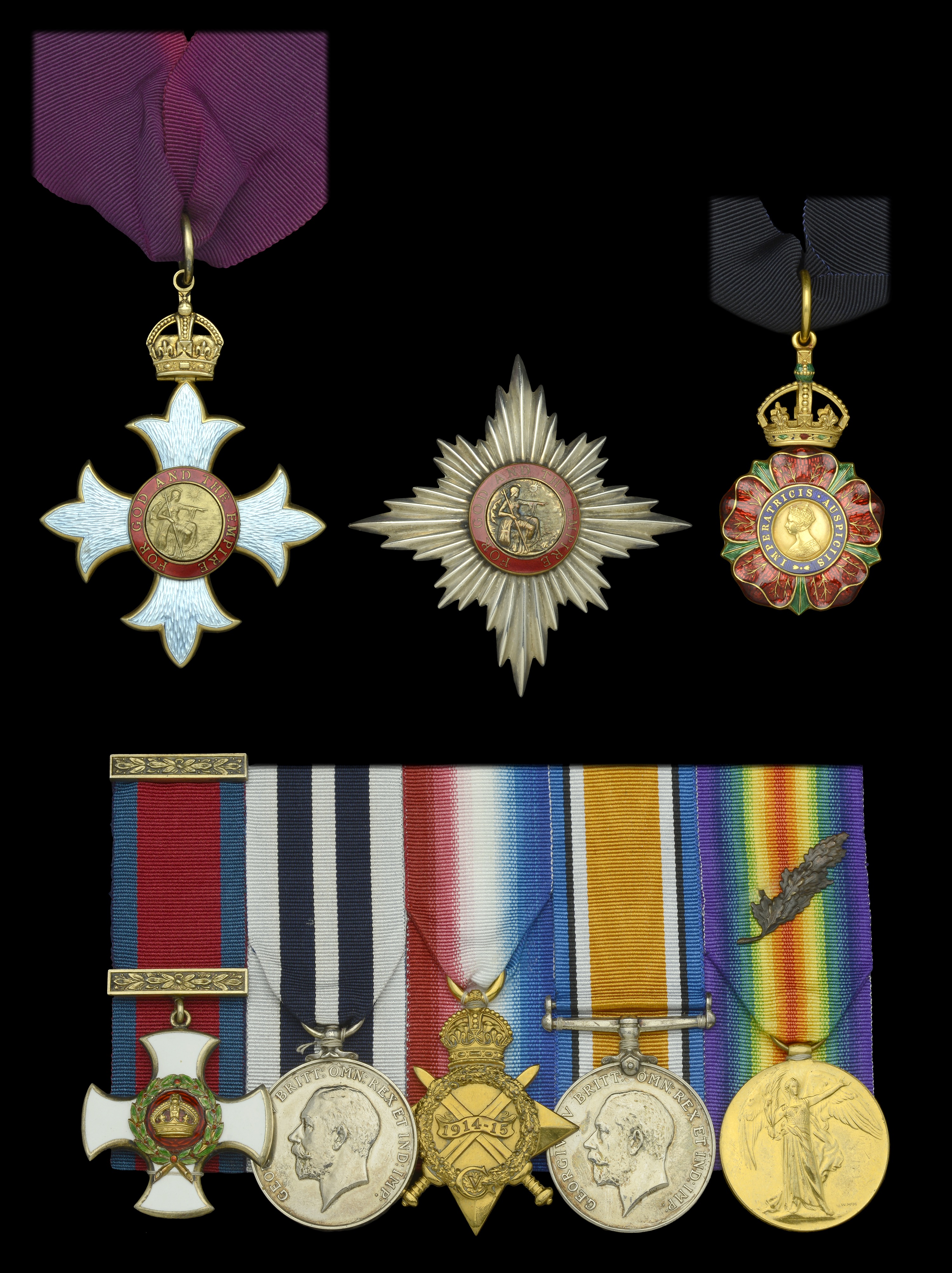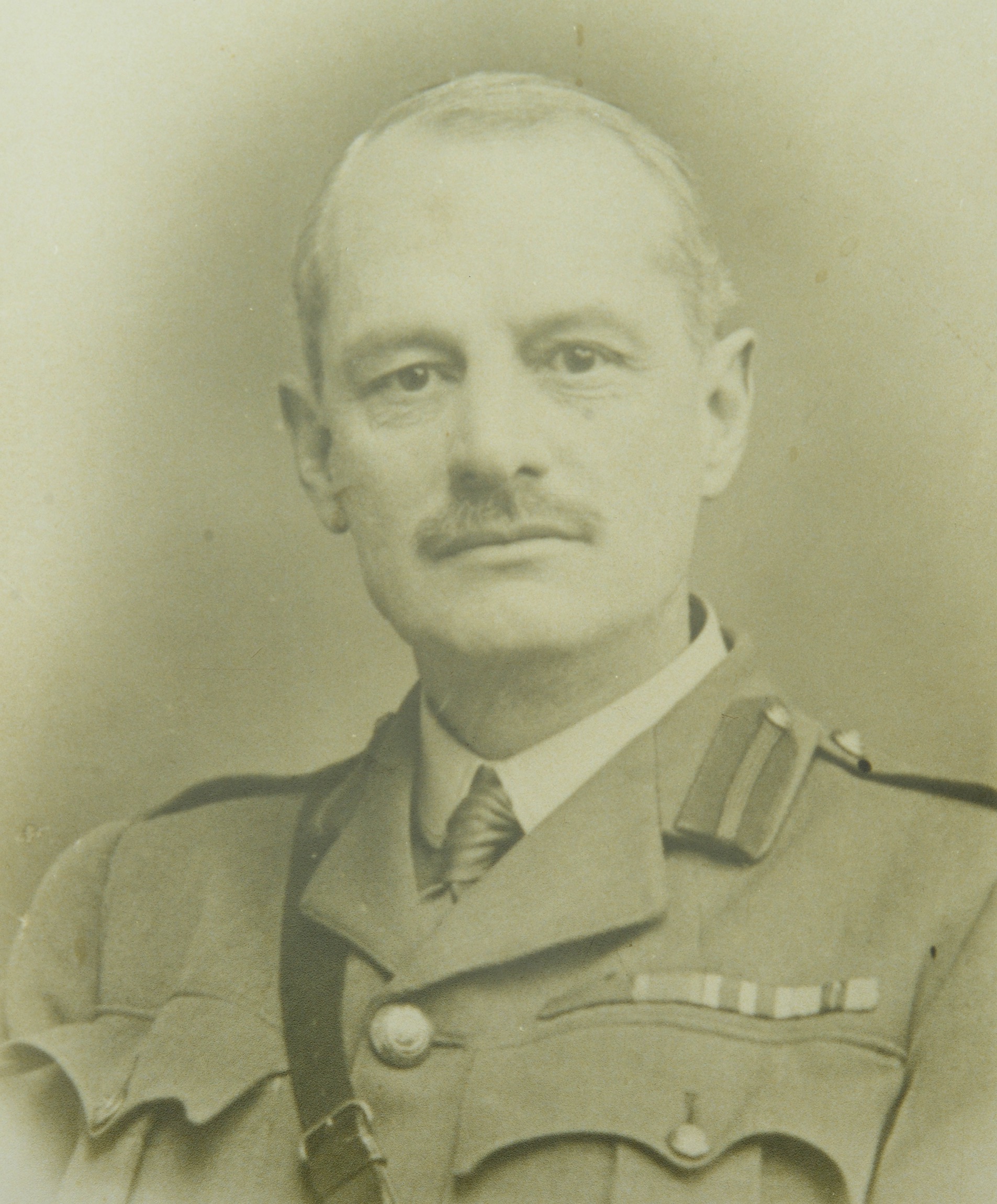The important K.B.E, C.I.E., D.S.O., K.P.M. group of seven awarded to Sir J. A. Wallinger, Deputy Commissioner of Indian Police, Head of the Indian Political Intelligence, for which appointment he was specially selected as being one of the best detectives in India: Policeman, soldier, spymaster - foremost amongst his recruits was the author Somerset Maughan The Most Excellent Order of the British Empire, K.B.E. (Civil) Knight Commander’s 1st type set of insignia, comprising neck badge, silver-gilt and enamels, and breast star, silver, silver-gilt and enamel; The Most Eminent Order of the Indian Empire, C.I.E., Companion’s 3rd type neck badge, gold and enamels; Distinguished Service Order, G.V.R., silver-gilt and enamels, with integral top ribbon bar; King’s Police Medal, G.V.R., 1st issue (John A. Wallinger. Supt., Bombay Pol.); 1914-15 Star (Major J. A. Wallinger.); British War and Victory Medals, with M.I.D. oak leaves (Major J. A. Wallinger.), the last five mounted for display, nearly extremely fine (8) £3,000-£4,000 --- K.B.E. London Gazette 3 June 1925. C.I.E. London Gazette 1 January 1918: ‘Temporary Major, D.S.O., Indian Police.’ D.S.O. London Gazette 14 January 1916: ‘Temporary Major, Special List (General Staff Officer).’ K.P.M. London Gazette 1 January 1914: ‘Superintendent, Bombay Police.’ M.I.D. London Gazette 1 January 1916: ‘Temporary Major, Intelligence Corps.’ John Arnold Wallinger was born on 25 October 1869, at Poona, India, where his father, William, was deputy conservator of forests. He was baptised into the Church of England at the age of three weeks, after which nothing is known of him until 27 November 1896 when, at the age of 27, he joined the Indian Police. His initial appointment was as an inspector in Ahmedabad, north of Bombay on the route of the railway line to Delhi. After five years he was promoted to assistant superintendent, and in July 1902 was seconded to the Metropolitan Police for three months. Officially he was attached to 'C' and 'E' Divisions as an instructor. However, the coronation of King Edward VII - which was originally planned for June - took place in August of that year. He may well have taken over watching Indian nationalists during the coronation from someone unable to stay after the initial date was postponed. From November 1903 he was described as being ‘on deputation to Scotland Yard'. On his return to India, possibly still on the west coast in the Bombay area, he was involved in special duties connected with an outbreak of bubonic plague during 1904-5, before he could settle back into normal police work. One of the best places to acquire information of criminal and political activities was the gambling den. Wallinger would visit these dressed as an Indian, and, with his mastery of indigenous languages, was able to pass himself off as a local man. His subordinates once raided a den, and such was Wallinger's disguise that he was arrested by his own men. On another occasion, while on mounted duty at a demonstration he saw a colleague in trouble and went to assist. He received a sword cut to his head from one of the demonstrators, which put him in hospital for three months. Wallinger was promoted to superintendent, and by early 1909 was described as being on 'special duty working in the Criminal Investigation Department'. The following year he was transferred to London and appointed to be in charge of all political intelligence matters in America and Europe relating to India. He received the K.P.M. on I January 1914. With the outbreak of the First World War he was gazetted a major attached to the Imperial General Staff. His duties initially were concerned with preventing anti-British propaganda from reaching Indian troops serving in France. Their letters home were read by Wallinger's staff to ensure that no subversive sentiments reached the sub-continent. This work resulted in his being thanked personally by the Marquess of Crewe, when he was Secretary of State for India, and by his successor, Sir Austen Chamberlain. The end of the war saw his ultimate recognition for these duties when he was appointed a Companion of the Indian Empire in 1918. John Wallinger had a younger brother, Ernest, who was a professional soldier and who, by 1915, held the rank of major. Ernest was somewhat different to his older brother, for he was a graduate of Clare College, Cambridge, and had married a lady of considerable social standing. An original member of the British Expeditionary Force, he had lost a foot at the Battle of the Aisne in September 1914. Unfit for active service, he established an office in early 1915 to collect intelligence from Belgium. Coincidentally, John Wallinger had an interest in Switzerland, as a number of Indian nationalists had taken refuge there at the start of the war. Hence, when the need arose to control an intelligence gathering operation from Switzerland, Ernest Wallinger had little trouble in ensuring that the job went to his brother. The existing British organisation in Switzerland was used by John Wallinger to send spies into Germany, collect information and then pass it back to him in France. The Swiss were, however, vigilant in protecting their neutrality, and after six months it was extremely difficult for his men to work in the country. He needed to find someone new, whom the Swiss authorities would not suspect of being in British intelligence. Like his brother, John Wallinger had found himself drawn to a lady of a higher social level than his own. Unlike his brother, though, he had not married her and she had become his mistress. This lady was a friend of Syrie Welcome, who was the estranged wife of the American drug manufacturer, Henry Welcome; the daughter of philanthropist, Dr Barnardo; and the mistress of the writer, Somerset Maugham. The couples dined together several times, and Maugham used these occasions to express the wish to do something useful to help the war effort. There was no doubting Maugham's patriotism or his bravery. Despite his age - he was now 40 - he had managed to get a posting as an interpreter with an ambulance unit in Ypres. Although Maugham had qualified as a doctor, he had never practised as such, but he did speak French and German. His work took him close to the front line, and at times he had come under enemy fire. However, he had given up this work due to a tangled state of personal affairs, which included Syrie’s pregnancy. Maugham subsequently went to Geneva for John Wallinger where, using his cover as a writer, he was able to control agents operating in Germany. He did, in fact, write a play while there called The Unattainable, the title of which was subsequently changed to Caroline. Some of the agents were of dubious quality, and he became discouraged with his work. This, coupled with Henry Welcome citing him as co-respondent in divorce proceedings against Syrie, caused him to resign in February 1916. Nevertheless, Maugham continued to look after the Swiss operation until May, when Wallinger replaced him with a playwright, Edward Knoblock. Switzerland continued to be a difficult area from which to work, and John Wallinger tried to develop an operation in Denmark to gather intelligence from Germany. This was not a success, and by August 1916 he was working solely on his Indian intelligence activities. After the war, he was awarded the DSO for controlling a network of agents who had worked deep inside Germany, and thereafter he continued his political intelligence work for the Government of India from a base in London. Then, in 1919, he was seconded to Egypt where he carried out work on the surveillance of Indian nationalists. When he returned to London from this posting he was promot...






